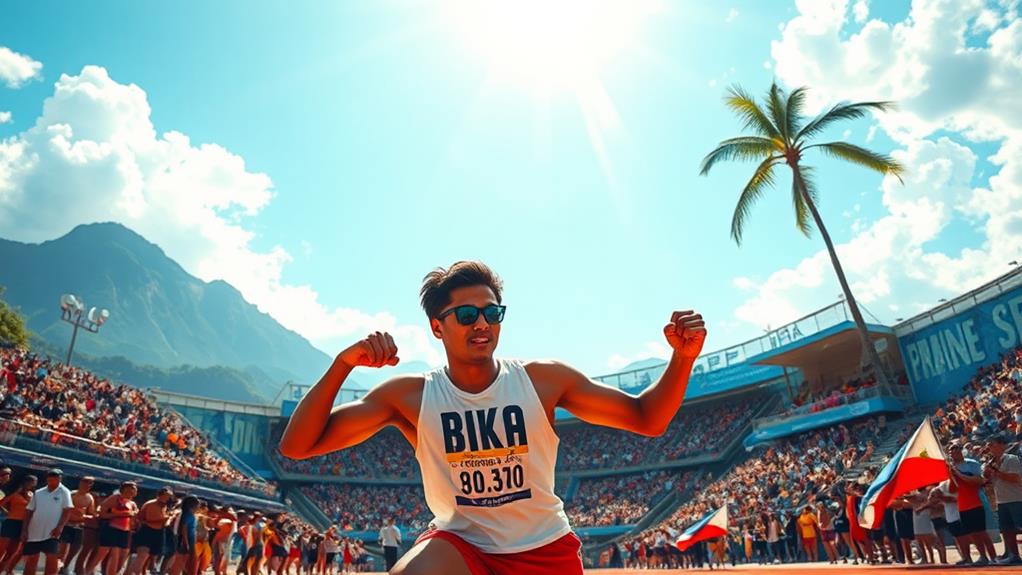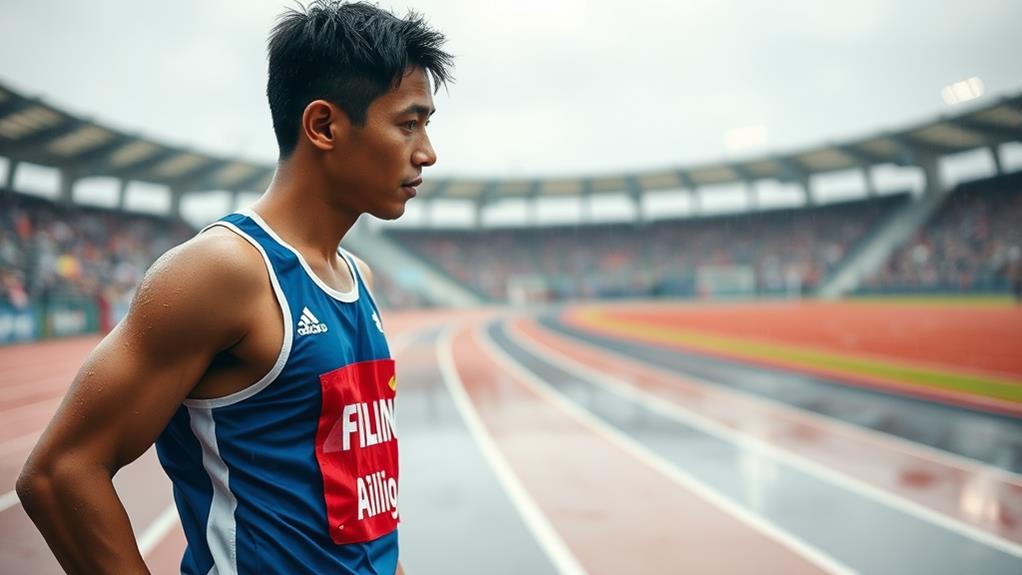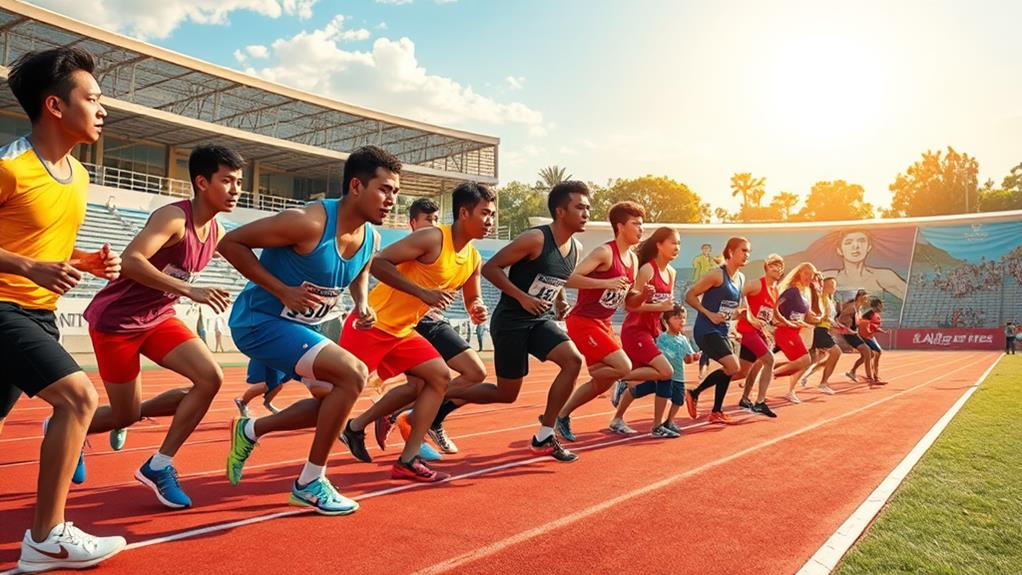Filipino athletes demonstrate exceptional resilience in the face of challenges.
They draw strength from cultural values like pakikisama, which emphasizes teamwork and community support. For instance, in basketball, Filipino players often prioritize team harmony over individual achievements, leading to stronger bonds and better performance.
Mental toughness is crucial in enabling athletes to maintain focus and positivity under pressure. This is evident in the way Filipino boxers, such as Manny Pacquiao, have overcome adversity to achieve success in the ring.
Commitment, control, and confidence are essential traits that help athletes navigate setbacks. For example, Filipino weightlifter Hidilyn Diaz's unwavering commitment to her training regimen allowed her to overcome injuries and eventually win the country's first Olympic gold medal.
Psychological strategies like mindfulness and visualization enhance athletes' performance and coping mechanisms. Filipino gymnast Carlos Yulo, for instance, credits his mental preparation techniques for his ability to stay focused and composed during competitions.
Embracing setbacks as growth opportunities is key to turning failures into fuel for success. Filipino athletes often view losses as chances to learn and improve, rather than letting them discourage them.
This mindset enables them to bounce back stronger and more determined.
Understanding Mental Toughness

Mental toughness is essential for athletes to excel under pressure. It's the capacity to handle stress and pressure, characterized by traits like self-efficacy, resilience, persistence, and the ability to cope with adversity.
82% of wrestling coaches believe mental toughness is vital for competitive success, highlighting its importance across various sports.
Mental toughness consists of 12 components, including task focus, positivity, and goal commitment, which showcases its multidimensional nature. When an athlete exhibits mental toughness, they are more likely to maintain their performance levels during challenges and see pressure as an opportunity rather than a threat. This perspective can dramatically impact their results.
Psychological preparation and training are key to developing mental toughness. Athletes can develop essential components like commitment, control, challenge, and confidence through structured mental skills training.
By focusing on these elements, athletes enhance their ability to thrive under pressure, ultimately paving the way for success in their athletic endeavors.
Embracing mental toughness is a game changer that can set athletes apart from the competition.
Stories of Filipino Athletes
Filipino athletes exemplify resilience and determination in the face of challenges. Take Hidilyn Diaz and Carlos Yulo, for example. Despite navigating significant personal struggles and setbacks in international competitions, they've achieved remarkable success on the global stage.
Their experiences demonstrate how Filipino athletes often view setbacks as opportunities for growth, enhancing their resilience for future performances.
Mental toughness is crucial for overcoming adversity. Kiefer Ravena's performance during illness is a prime example. Despite being unwell, he pushed through and delivered a strong performance.
The relentless spirit of these athletes is often fueled by the unwavering support from the Filipino community. This collective effort serves as a motivational anchor, reinforcing their resolve to succeed.
These inspiring stories highlight the core values of hard work, discipline, and unity. They not only celebrate individual triumphs but also illuminate the values that drive Filipino athletes to succeed.
The resilience of Filipino athletes defines their careers and inspires future generations. By embracing challenges, these athletes exemplify what it truly means to persevere in the pursuit of excellence in sports.
Key Factors in Resilience

Commitment, control, challenge, and confidence are the essential components of resilience in Filipino athletes. These traits enable them to navigate setbacks and turn obstacles into opportunities for growth, ultimately enhancing their performance and fostering a culture of hard work.
Support systems play a crucial role in building resilience. Family, coaches, and teammates provide the necessary encouragement when facing challenges, helping athletes cope with pressures and the fear of failure.
For instance, a coach's guidance can help an athlete develop a pre-game routine to manage anxiety.
Psychological preparation is vital in building resilience. Mental toughness training equips athletes with coping strategies to handle stress effectively. This training can include techniques such as visualization, positive self-talk, and breathing exercises to manage competition nerves.
Cultural factors also reinforce resilience among Filipino athletes. The value of pakikisama, which emphasizes group harmony and collaboration, creates a supportive team environment.
This camaraderie nurtures a sense of belonging, fueling an athlete's determination to succeed. For example, a team's collective goal to win a championship can motivate individual athletes to push themselves harder.
Psychological Strategies for Success
Filipino athletes use psychological strategies to improve performance and manage competition pressure.
To achieve peak performance, athletes focus on self-efficacy and resilience, enabling them to navigate challenges more effectively.
Mental preparation is as crucial as physical training, and incorporating reaction and decision-making drills can significantly boost mental toughness and overall athletic effectiveness.
Mindfulness and well-being techniques help manage stress and foster resilience. These coping strategies allow athletes to stay focused amidst adversity, remaining mentally resilient.
By practicing these techniques, athletes develop a stronger sense of control over their emotions and reactions.
Integrating mental skills training into regular practice supports psychological development alongside physical growth. Coaches and trainers play a crucial role in creating an environment that nurtures this development, ensuring athletes have the necessary support to thrive.
Cultural Influences on Performance

Cultural Influences on Performance
In the Philippines, cultural values significantly impact athletes' performances. Filipino culture shapes how athletes approach teamwork and competition, leading to unique strengths in their performances.
Fostering Team Harmony
Filipino athletes are influenced by the value of _Pakikisama_, which prioritizes group harmony. This promotes collaboration, enhancing team dynamics and effectiveness.
For example, in basketball, Filipino players often prioritize setting screens and making passes to teammates, demonstrating their commitment to collective success.
Motivated by National Pride
Filipino athletes feel a strong sense of duty to represent their country, motivating them to overcome challenges and perform at their best. This national pride drives them to push beyond their limits, as seen in the determination of Filipino boxers like Manny Pacquiao.
Drawing Strength from Heritage
Cultural narratives of perseverance inspire Filipino athletes to face adversity with optimism. They draw strength from their roots, using them to overcome high-pressure situations.
The story of Filipino runner Lydia de Vega, who overcame poverty and personal struggles to become a champion, is a testament to this resilience.
Collective Success Mindset
Filipino culture emphasizes collective achievements over individual glory, cultivating a determination among athletes to succeed together.
This mindset reinforces their mental toughness, as seen in the Philippines' triumphant performances in team sports like volleyball and soccer.
These cultural influences develop a unique resilience in Filipino athletes, aiding their performance and strengthening their bond with each other and their community.
This shared commitment fuels their drive to excel, showcasing the profound impact of culture on athletic success.
Community and Athlete Support
Community support is vital for athletes' success. In the Philippines, local fans and organizations play a crucial role in shaping athletes' journeys.
When athletes receive encouragement from fans, it boosts their motivation and morale, especially in high-pressure situations. For instance, hearing cheers from the stands or receiving support on social media can give athletes the strength they need to perform at their best.
Recognition of athletes' efforts fosters unity within the community. When athletes are celebrated, it inspires others to rally behind them, creating a network of support that's essential during both triumphs and defeats.
The cultural value of pakikisama (collaboration and teamwork) enhances this dynamic, contributing to athletes' mental toughness and collective success.
Athletes' support systems are essential for their success. Family, coaches, and peers provide emotional backing and practical assistance that help athletes navigate the challenges of training and competition.
These support systems enable athletes to persevere and strive for excellence in their athletic endeavors.
Learning From Setbacks

Setbacks are invaluable teachers that offer athletes moments for introspection and growth. Filipino athletes, in particular, develop a mindset that embracing setbacks strengthens their resilience and determination.
Learning from Setbacks
Setbacks can be opportunities for growth. View setbacks as chances to analyze weaknesses and identify areas for improvement. This mindset allows athletes to pinpoint what went wrong and work on becoming better.
Developing mental resilience is crucial in overcoming setbacks. Employ mental techniques that help you stay focused and motivated during tough times. For example, visualization and positive self-talk can help athletes stay motivated and focused on their goals.
Having a strong support system is vital in bouncing back from disappointments. Lean on your community for encouragement, as their support can be crucial in overcoming obstacles. A support system can provide emotional support, helping athletes to stay motivated and focused.
Focusing on improvement is key to overcoming setbacks. Use failures as fuel to enhance your skills, recognizing the direct connection between overcoming obstacles and advancing in your sport.
For instance, Hidilyn Diaz, a Filipino athlete, overcame personal struggles and the threat of retirement to achieve remarkable success. Her determination to improve led her to become a champion.
Celebrating Collective Achievements
Collective achievements among Filipino athletes demonstrate the strength that comes from unity and collaboration. When Filipino athletes win medals at international competitions, it's not just a personal triumph, but a symbol of shared commitment and national pride.
Teamwork is key to success in international competitions. For instance, events like the Southeast Asian Games foster a spirit of collaboration, where athletes rally around a common goal. This environment cultivates a sense of community, motivating individuals to push their limits and excel.
Individual victories have a broader impact. Take athletes like Hidilyn Diaz and Carlos Yulo, for example. Their wins inspire a generation and demonstrate the power of teamwork. The unwavering support from fans and the community is crucial, reinforcing the idea that every success is a collective victory.
Celebrating collective achievements builds resilience and encourages collaboration. By recognizing these accomplishments, we're not just acknowledging personal feats, but embracing a legacy of unity and strength within the Filipino athletic community.
This emphasis on collaboration uplifts individual spirits and builds a national identity rooted in shared success.
How Have Filipino Athletes Overcome Challenges in Their Transition to E-Sports?
Filipino athletes have embraced the rise of filipino esports teams by adapting their skills to the virtual arena. Overcoming challenges such as traditional sports norms and lack of recognition, they have found success in the competitive world of e-sports. With dedication and resilience, Filipino athletes have made a lasting impact on the e-sports industry.
Inspiring Future Generations

The achievements of Filipino athletes serve as a beacon of inspiration for future generations, reflecting a legacy of unity and showcasing the power of dedication and resilience.
When athletes like Hidilyn Diaz succeed, they demonstrate that hard work can break barriers, even in less mainstream sports. Her journey, alongside others like Carlos Yulo, highlights the importance of perseverance and determination.
As role models, they inspire the youth around them in several ways:
National Pride is fostered when high-profile achievements motivate young athletes to chase their dreams. For example, Hidilyn Diaz's Olympic win sparked a wave of national pride, encouraging young Filipinos to pursue their own athletic careers.
Athletes' stories of overcoming challenges, such as resilience, teach youth the importance of perseverance and determination. Hidilyn Diaz's journey from poverty to Olympic champion is a testament to the power of resilience.
The collective identity within Filipino athletics promotes teamwork, teaching youth to work together toward common goals. The Filipino athletic team's support for each other during international competitions is a prime example of this.
Finally, celebrating both successes and struggles cultivates a culture of excellence, where young Filipinos embrace challenges and strive for greatness, not just in sports but in all aspects of life.
Recommendations for Development
Elevate Filipino Athletes' Performance through Mental Resilience
Focus on Mental Resilience Development
To truly elevate the performance of Filipino athletes, developing their mental resilience alongside physical training is crucial. One effective approach is to implement tailored psychological tests and programs that identify specific areas for improvement. This strategy not only enhances mental toughness but also creates a roadmap for resilience building.
Integrate Mental Skills Training into Practice Routines
Integrating mental skills training into regular practice routines is essential. As a coach or trainer, fostering a holistic approach that addresses both physical and psychological preparedness will yield better results.
For example, encouraging community involvement can strengthen athletes' resolve during competitions, as national solidarity can boost their motivation and resilience.
Promote Well-being Practices
Promoting well-being practices like mindfulness is an effective strategy. These practices help athletes cope with stress and adversity, enhancing their overall psychological resilience during challenging times.
Mindfulness, for instance, can reduce anxiety and improve focus, leading to better performance.
Conduct Continuous Research
Continuous research on athletes' lived experiences is vital. This research informs effective strategies and initiatives, ensuring comprehensive support for mental toughness and performance enhancement in sports.
By studying athletes' experiences and challenges, coaches and trainers can develop targeted programs to address specific needs.
Questions and Answers
What Is the Resilience of Being a Filipino?
The resilience of being Filipino stems from cultural strength rooted in values like "pakikisama," which emphasizes community support. This value enables Filipinos to draw motivation from shared experiences and collective effort, resulting in a strong sense of unity.
When faced with challenges, Filipinos transform setbacks into learning opportunities, adopting a growth mindset. This mindset allows them to rise above difficulties, learn from failures, and emerge stronger.
Filipinos' pride in their heritage fuels their drive to overcome obstacles and achieve greatness. For instance, the Bayanihan spirit, which translates to "being a hero to one another," showcases the Filipino resilience in action.
During natural disasters, Filipinos come together to support each other, demonstrating their ability to rise above adversity.
This collective resilience inspires future generations to embody the same values, fostering a sense of community and national pride.
How Do Athletes Overcome Challenges?
Athletes overcome challenges by developing mental fortitude, which enables them to face setbacks with determination. This mental strength is built by viewing failures as opportunities for growth, rather than setbacks. For instance, a tennis player who loses a match can analyze their mistakes and work on improving their serves and volleys for the next competition.
Support from coaches and teammates strengthens an athlete's resolve, providing encouragement and guidance during difficult times. A gymnast, for example, may receive feedback from their coach on how to perfect their routine, boosting their confidence and motivation.
Mental strategies like mindfulness help athletes manage pressure. Mindfulness techniques, such as deep breathing and visualization, can calm an athlete's nerves and focus their mind on the task at hand. A football player, for instance, may use mindfulness to stay focused under the intense pressure of a championship game.
Fostering a strong collective identity prioritizes teamwork, reinforcing an athlete's motivation to perform well for their team. When athletes feel a strong bond with their teammates, they're more likely to push themselves to achieve victory. For example, a soccer team that works together, supports each other, and celebrates each other's successes is more likely to win games.
Ultimately, these elements combine to build resilience, empowering athletes to tackle any obstacle in their path. By developing mental fortitude, receiving support, using mental strategies, and prioritizing teamwork, athletes can overcome challenges and achieve success in their respective sports.
How Do Athletes Show Resilience?
Athletes demonstrate resilience through mental toughness, which enables them to recover from setbacks and maintain their performance under pressure. This mental toughness allows them to view challenges as opportunities for growth, focusing on the process rather than the outcome. For instance, when faced with an injury, a resilient athlete will focus on rehabilitation and recovery rather than dwelling on the setback.
Self-efficacy and persistence are key components of resilience. Athletes who believe in their abilities and are willing to put in the effort required to overcome obstacles are more likely to succeed. For example, a tennis player who loses a set may draw on their self-efficacy to refocus and win the next set.
Surrounding themselves with a supportive team and coaches enhances an athlete's resilience. Having a network of people who provide encouragement and guidance helps athletes navigate adversity. A soccer player who's a supportive coach and teammates is more likely to bounce back from a mistake during a game.
Mindfulness practices help athletes manage stress and maintain a positive outlook. By staying present in the moment and focusing on their breathing, athletes can reduce stress and anxiety, allowing them to perform at their best. For instance, a golfer may use mindfulness to calm their nerves before a crucial shot.
What Are the Struggles of Athletes?
Athletes face numerous struggles that test their mental toughness. High expectations from coaches, fans, and themselves can create pressure to perform. For instance, a basketball player might feel the weight of their team's reliance on them to score points.
Personal challenges, such as family issues, can also affect performance. A gymnast dealing with a family member's illness might find it difficult to focus on their routine.
Setbacks and criticism can shake an athlete's confidence, making it tough to stay motivated. For example, a tennis player who loses a crucial match might doubt their ability to win future games.
The pandemic added another layer of difficulty by disrupting training and competition schedules.
To overcome these obstacles, athletes need to develop resilience, turning each struggle into a stepping stone for growth and improvement.